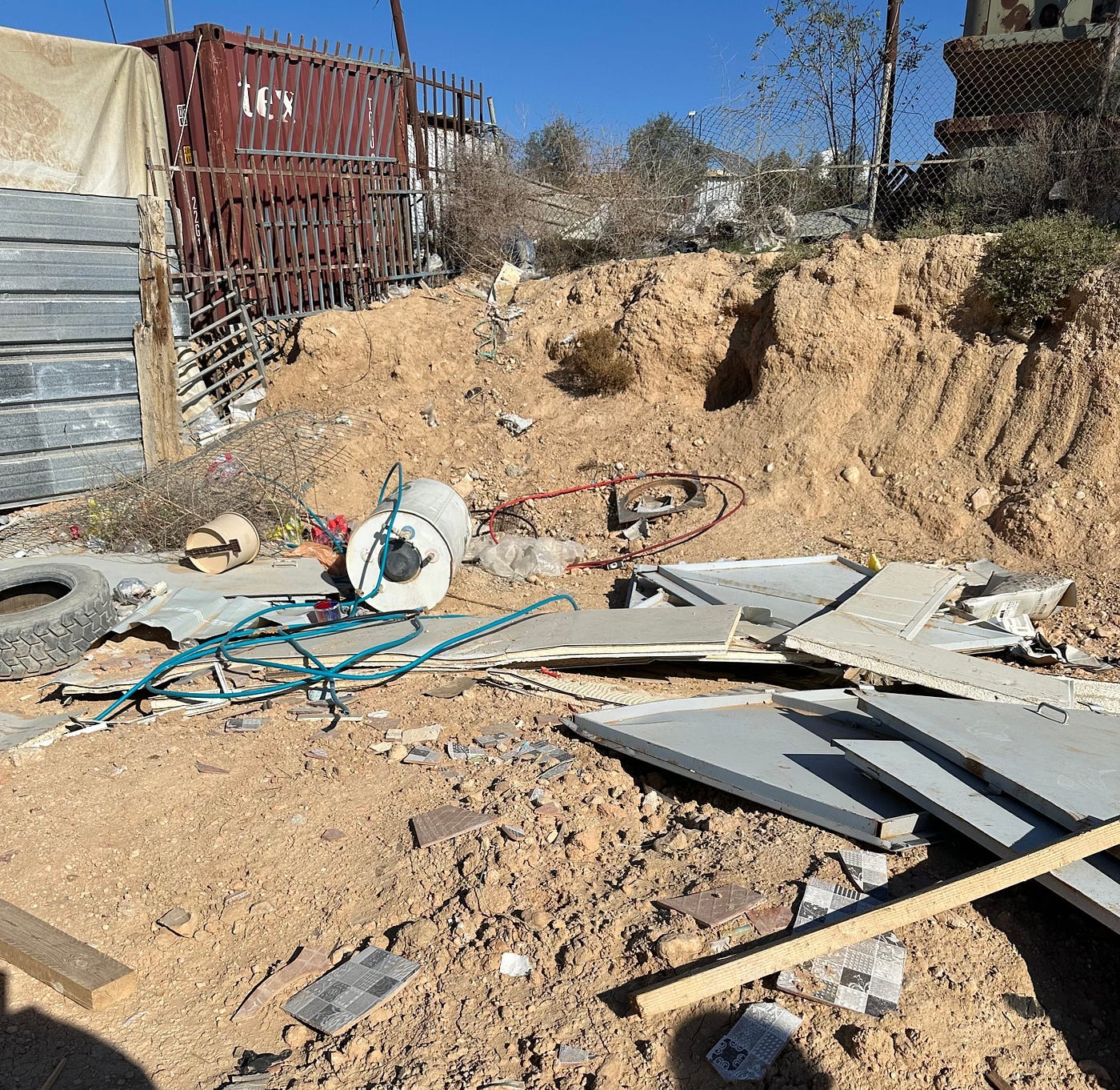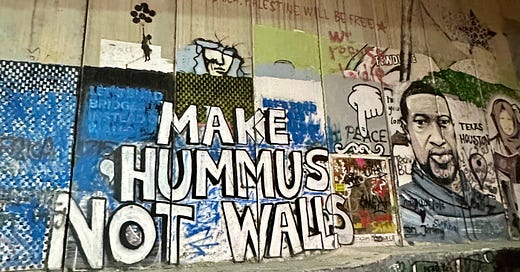MBAs for Palestine: On the Disturbing Proliferation of Israel Treks at Top Business Schools
We’re writing this letter to the MBA community at Haas and beyond to share what we learned from visiting Palestine.
This letter was originally posted on Notion: 💌On the Disturbing Proliferation of Israel Treks at Top Business Schools
We’re especially motivated to share this now given the upcoming 75th anniversary of the Nakba (“The Catastrophe”) this month as well as recent events: the Israeli military’s violence against Muslim Palestinian worshippers during Ramadan and Christian Palestinian worshippers during Easter, the bigoted rhetoric of Israeli ministers to “wipe out” Palestinians and a destructive pogrom carried out upon a Palestinian town.
As MBA students, our privilege and platforms must be leveraged to advance, not undermine, human rights.
We’re three full-time 2023 MBA students and Consortium Fellows at the Haas School of Business — Jude Watson, arohi bhatt and Afraz Khan. Together, we’ve been very active in Haas student government, social justice work, and Muslim student engagement on campus. We’ve also participated in Berkeley’s annual solidarity delegations to Palestine for graduate students.
See more: 💼 Why is Palestine relevant to MBA students and graduates?
Israel Treks (”iTreks”) are offered at over 15 top business schools, and one of the primary ways that b-school students interact with the state of Israel. To learn more about the Israel Treks offered across different b school programs, we interviewed 10 MBA students who’ve attended iTreks across 3 business schools, along with 4 different pro-Palestinian organizers.
What’s happening in Palestine?
Echoing what Palestinians have been saying for nearly 8 decades, multiple mainstream human rights organizations including Amnesty International, Human Rights Watch, and B’Tsalem: The Israeli Information Center for Human Rights have shared groundbreaking reports confirming Israel’s state and settler-led ethnic cleansing and apartheid conditions imposed on Palestinians.

“Israel imposes a system of oppression and domination against Palestinians across all areas under its control: in Israel and the Occupied Palestinian Territories, and against Palestinian refugees, in order to benefit Jewish Israelis. This amounts to apartheid as prohibited by international law. Laws, policies and practices which are intended to maintain a cruel system of control over Palestinians, have left them fragmented geographically and politically, frequently impoverished, and in a constant state of fear and insecurity.” Amnesty International
“Israeli authorities have carried out a range of inhumane acts in the Occupied Palestinian Territories. Those include sweeping restrictions on the movement of 4.7 million Palestinians there; the confiscation of much of their land… which has led thousands of Palestinians to leave their homes under conditions that amount to forcible transfer, the denial of residency rights to hundreds of thousands of Palestinians and their relatives… and the suspension of basic civil rights.” Human Rights Watch
See more: 🌍 What’s the history here?
During our trips to Palestine, we witnessed these brutal conditions firsthand.
“There is no Palestinian who has not experienced visceral trauma under Israeli Occupation.” Palestinian community leader, 2023
We visited a diverse array of Palestinian communities, including “unrecognized villages,” historic Palestinian communities that have existed for over a hundred years, long before Zionists began entering the land. Despite clear records of decades of familial and ancestral ties to the land, the Palestinian villages are now deemed “illegal.”

In both recognized and unrecognized Palestinian communities, Israel manipulates and coerces Palestinians to leave their homes through daily violence on physical, civil, and psychological levels.
For Palestinians, this looks like:
Access to electricity and water being shut off for weeks or months in Palestinian communities, while it is made both accessible and affordable to nearby Israeli settlements. With no electricity, Israel creates food insecurity because Palestinians can’t refrigerate their meats, dairies, and perishables. Sick Palestinians are deprived of healthcare (like dialysis machines). In Gaza, Palestinians only have access to 4 hours of electricity a day.
Families waking up every day, worried that the Israeli military will come to demolish their home.
A mother terrified to send her children to school for fear they will be harassed by the Israeli military and settlers.
Palestinian communities that are annexed by continued construction of the illegal wall, cut off from each other and key resources by checkpoints and Israeli settlements. The massive presence of Israeli military restricts daily movement and connection. Daily transportation is often blockaded, resulting in hours added to commutes.
Israeli forces killing 71 Palestinians in the West Bank, including 13 children, between Jan. 1 and March 7 of this year, according to the U.N. Office for the Coordination of Humanitarian Affairs.
See our Notion hub for more vignettes on the reality of apartheid.
What does this have to do with Israel Treks?
Many top-ranked business schools offer an annual Israel Trek — Haas last offered one in 2022. When you first hear about an Israel Trek, the trips may seem like a typical business school trip: a group vacation to experience a new culture and party with peers.
However, B-school Israel Treks have a political agenda and are often subsidized by the Israeli government or Israeli donors to incentivize students to visit Israel and build a positive view of the country. iTreks are particularly focused on U.S. schools, primarily because of the U.S.’ unconditional financial and military support of Israel as well as its complete diplomatic protection from dozens of U.N. resolutions critical of Israeli policy.
iTreks generally consist of long days packed with programming that includes extensive pro-Israel political messaging and hides Israel’s apartheid treatment of Palestinians.
On the programming of Haas’s Israel Trek:
“There were a lot of things that felt like white supremacy and very anti-Arab in my mind. [Our tour guide] was justifying the Israeli side… there was a lot more bias than I anticipated.” Haas MBA iTrek Attendee, 2022
“I felt 100% deceived… [Israel Trek] was packaged as a touristy trip… the biggest surprise was how much time we spent on talking about the whole political situation. I was expecting something more tourism focused.” Another Haas MBA iTrek Attendee, 2022
Sometimes a few Palestinian speakers are invited to participate in iTrek programming. These speakers generally are confined to speaking only about apolitical topics, or will not be allowed to speak freely and uninterrupted about their life experiences.
What happens on an Israel Trek?
The itineraries of university Israel Treks are similar to the itinerary of Birthright, a propaganda program run by the Israeli government for Jews from around the world to visit Israel.
“Someone [on our trip] who has been on Birthright said it was a really similar agenda and trip.” MBA Student & Israel Trek Participant
The organization Jewish Voice for Peace, a Jewish-led group that supports Palestinian rights, describes Birthright this way, in a description that could apply just as easily to business school Israel Treks:
“Trip agendas are carefully constructed to present an imaginary, propagandized portrayal of Israel, to erase the existence of Palestinian life, and to shore up support for Israel’s occupation, apartheid and denial of the right of Palestinian refugees to return. The absence of substantial Palestinian encounters or perspectives on Birthright trips reflects the degree to which the program constructs an impression of Israel not grounded in reality… Birthright trips never address the plethora of apartheid laws within Israel that discriminate against Palestinians in nearly every aspect of life.”
What won’t you learn on an Israel Trek?
Palestinians cannot publicly display their own flag
Palestinians cannot acknowledge historical events that led to the expulsion of millions of their people
Palestinians cannot vote for the very institutions that dictate their ability to live, work and travel
Palestinians cannot travel freely within their lands and must spend hours funneling through checkpoints and obtaining permits just to get to work or visit family
Palestinians living within Israel attend segregated schools, live within contained neighborhoods and are systemically discriminated against
Here’s what Palestinian student organizer Nadine Bahour (Harvard ’22) said regarding her classmates attending iTrek:
“Growing up in Palestine, I see what settlers do. And I see the oppression and the colonialism that is enacted by the IDF (Israeli Defense Forces) and by settlements on a daily basis. To think that my fellow students are going on a trip where they’re experiencing that reality in a glorified way — where it’s fun to go and visit the region, and it’s totally normal to go and visit a settlement — is definitely something that doesn’t sit well with me, because all that I experience is the oppression of settlements.”
Isn’t saying “Don’t go on an Israel Trek” antisemitic?
No, Israel is a state, not a person or a religion. Criticizing the actions of a state is not the same as bias or violence against a religious or ethnic group.
For example, in the United States, learning about and spreading awareness of the ongoing erasure and genocide of Native people in this country is not “anti-American,” it is a basic exercise of our First Amendment rights. Similarly, learning about and expressing opposition to Israel’s apartheid actions is not “antisemitic.”
There are many Jewish people and Jewish-led groups who strongly oppose the actions of Israel including Jewish Voice for Peace (which has a membership of over 300,000 people), If Not Now, and B’Tselem: The Israeli Information Center for Human Rights in the Palestinian Territories.
📚 See also: Zionist Colonialism in Palestine, Fayez Sayegh; Zionism from the Standpoint of its Victims, Edward Said
Antisemitism (defined as the bias against, violence against, and systemic oppression of Jewish people) is a very real issue, historically and currently.
The conflation of critique of Israel with antisemitism is a tactic used by Israel’s supporters to shut down conversation and conceal Israel’s human rights abuses. For a Jewish perspective on why critique of Israel is not antisemitic, please read more here.
What should I do instead of going on an Israel Trek?
A refusal to participate in an iTrek is a refusal to participate in the continued oppression of Palestinian people.
See more: How are students at various schools resisting iTreks?
Instead, go on a trek to a country that’s not classified by mainstream international human rights organizations as an apartheid state. You’ll have more fun!
Share this letter with your community. Remember that we are all still learning and building our analysis. It’s important for us to remain curious, use critical thinking, and continue seeking out Palestinian perspectives since they are often ignored or repressed by mainstream American media sources.

Interested in getting involved or visiting Palestine on a solidarity delegation trek? Indicate your interest here. Note — you do not have to be a full-time student to attend. Eyewitness Palestine also coordinates solidarity treks.










Well said!! In the only "democracy" in the Middle East:
1. Palestinians cannot publicly display their own flag
2. Palestinians cannot acknowledge historical events that led to the expulsion of millions of their people
3. Palestinians cannot vote for the very institutions that dictate their ability to live, work and travel
4. Palestinians cannot travel freely within their lands and must spend hours funneling through checkpoints and obtaining permits just to get to work or visit family
5. Palestinians living within Israel attend segregated schools, live within contained neighborhoods and are systemically discriminated against
This is the same model used in the destruction of the Native Americans in USA, and thats why Israel has so much affinity to USA.
Love this, thank you for spreading such an important message and pushing back against apartheid propaganda ❤️❤️❤️ Free Palestine 🇵🇸